Research Roundup highlights the work of faculty in the Division of Social Sciences. For ongoing coverage of UCSC research, please visit the UCSC Newscenter and Social Sciences News.
Anthropology
Professor Nancy Chen published Addressing the Gap of Nutrition in Medical Education: Experiences and Expectations of Medical Students and Residents in France and the United States, in Nutrients. The article analyzes nutrition education in U.S. and French medical schools based on interdisciplinary collaboration with a medical sociologist, a medical anthropologist, and a MD/MPH. The authors engage ethnographic research to compare historical contexts of systemic nutrition knowledge as well as the growing role of culinary medicine, teaching kitchens, and social justice in medical curricula.
Assistant Professor Carla Hernández Garavito published Negotiated Cartographies in the Relaciones Geográficas de Indias: The Descripción de la provincia de Yauyos Toda (1586) in the journal Ethnohistory. The article uses spatial modeling to investigate how a map from the 16th century Peruvian Andes may allow researchers and others to explore the way in which Indigenous representations and understandings of the landscape influenced the portrayal of what would otherwise be considered only a tool of colonial administration.
Community Studies
Professor Julie Guthman published a research article, Decoupling from Land or Extending the View: Divergent Spatial Imaginaries of Agri-Food Tech in a special issue of Geographical Review, Future of Food. The tech sector, in its promises to improve the sustainability of food and agriculture, has exalted two areas of innovation: alternative proteins and digital agriculture. Oddly, the rationales for these innovations revolve on the use of space, but in highly divergent ways: alternative protein entrepreneurs seek to bring as much production indoors in highly contained spaces as environmental improvement while digital agriculture proponents argue that their technologies will facilitate the reduction in resource use over vast monocultures. This contradiction helps illustrate that the use of space is a poor proxy for environmental improvement.
Economics
Professor Nirvikar Singh published The 0.0003 Percent: Short-run dynamics of extreme wealth in America, in the Review of Income and Wealth. The paper examines short-run dynamics and changing sources of wealth among the Forbes 400 annual list of wealthiest individuals in the United States, before and after the 2008–2009 financial crisis. The authors analyze the interaction of growth of wealth with education, age, and being self-made versus inheriting wealth and find evidence of conditional convergence of wealth within the group. The wealth of the self-made grew faster than their counterparts, though less so after the crisis. Those with advanced degrees had higher pre-crisis growth of wealth than those without such degrees. Controlling for these characteristics, age was not a factor in wealth accumulation. Mobility in and out of the group was higher pre-crisis.
In addition, Professor Singh published Impacts of the COVID-19 Lockdown on Consumption: Household data from India, in Asian Development Review. This paper quantifies the impacts on consumption expenditure and the patterns following India’s initial sudden lockdown in response to the coronavirus disease pandemic and the gradual relaxation that followed using household survey data from a representative Indian state, Punjab. The data separates the effects between rural versus urban households, and whether the households were female headed or had daily laborers. While the urban population cut back expenditure across all categories, rural households shifted toward basic commodities and cut back more on other expenditure. Rural households that included daily-wage laborers were the most severely affected.
Professor Singh also published Impacts of the COVID lockdown on household incomes: evidence from Punjab, India in Empirical Economics. In response to the beginnings of the COVID-19 pandemic, India’s government instituted a severe nationwide lockdown in late March 2020. In this paper, the authors analyze household survey data on income from an Indian state, Punjab, focusing on the impacts of the pandemic and lockdown on total household income, as well as its components, including wages, business income and transfers. They examine the differences between rural and urban households, differential impacts on female-headed and laborer households, and the time pattern of impacts and find that rural households experienced more persistent income declines than urban households, and their wages suffered relatively more. Households with daily laborers were most badly affected, and this was especially true at the bottom of the income distribution.
Assistant Professor Jeremy West published the research study Cleaner Waters and Urbanization in the Journal of Environmental Economics and Management. The study examines how water pollution changes in rural watersheds after Clean Water Act sponsored projects are implemented. These public works projects take many forms, such as sediment retention basins, riparian fencing for livestock, and treatment of algae blooms. West’s study finds that the projects significantly reduce surface water pollution, and that this in turn increases local human population and residential development. More broadly, the findings highlight that people choose to live in and develop areas that are less polluted, which has important implications for environmental policy.
Education
Professor Judit Moschkovich published the chapter Academic Literacy in Mathematics to frame mathematical writing research and practice: Writing and revising for mathematical practices, in the volume Illuminating and Advancing the Path for Mathematical Writing Research (M. Colonese, T. Casa, & F. Cardetti, Eds. The chapter addresses the question: How can the academic literacy in mathematics framework (Moschkovich, 2015) inform research and practice on mathematical writing? Oral student contributions are important for learning mathematics, but without a written record of students’ reasoning, revising is difficult or impossible. While writing makes revising possible, research needs to theoretically frame what to revise, how to revise, and how to support revisions.
Professor Moschkovich also delivered an invited lecture Language and learning mathematics: A socio-cultural approach to Academic Literacy in Mathematics at the Proceedings of the 14th International Congress on Mathematical Education (ICME)-Shanghai, China. The nvited lecture summarized her work on language and learning mathematics and described a theoretical framework for academic literacy in mathematics (Moschkovich, 2015) that can be used to analyze student contributions and design lessons. The presentation included a classroom example and recommendations for instruction that integrates attention to language. Although the example is from a bilingual classroom, the theoretical framing and the recommendations are relevant to all mathematics learners, including monolingual students learning to communicate mathematically.
In June 2023, Professor Moschkovich was appointed by the National Academies of Sciences, Engineering, and Medicine to serve as a member of the U.S. National Commission on Mathematics Instruction. The purpose of the USNC/MI is to promote the advancement of mathematics education in the United States and throughout the world. The USNC/MI stimulates the involvement of the U.S. mathematics education community at the international level and serves to build global interaction among researchers and educators in mathematics.
Finally, Professor Moschkovich was appointed by the National Academy of Education to serve as co-chair for the Equity in Math Education Research Grants (EMERG) Program, funded by Gates Foundation, an early career research grant funded by the Gates Foundation (2023-2026, $1,700,000). The Gates Foundation selected the National Academy of Education as a partner to design and administer this program aimed at improving mathematics learning for students from Black, Latinx, and Indigenous communities and from communities experiencing persistent intergenerational poverty.
Environmental Studies
Associate Professor Madeleine Fairbairn published Setting data free: The politics of open data for food and agriculture in New Media and Society. Open data (data which is made publicly available and usable) is currently being celebrated as a route to agricultural development. Opening up government datasets, it is promised, has the potential to improve food security and small farmer livelihoods in the Global South, among many other benefits. But "openness" is a politically complex topic with a history of being applied in very different ways by different groups. It can be used comfortably by pro-business, small government libertarians, as well as anti-corporate, pro-commoning activists, and many others in between. This paper examines the politics of open data as it is currently being applied within the reality of agricultural development and find that it tends to conform more to an "anti-political," neoliberal vision of openness and furthermore threatens to reproduce some elements of data colonialism.
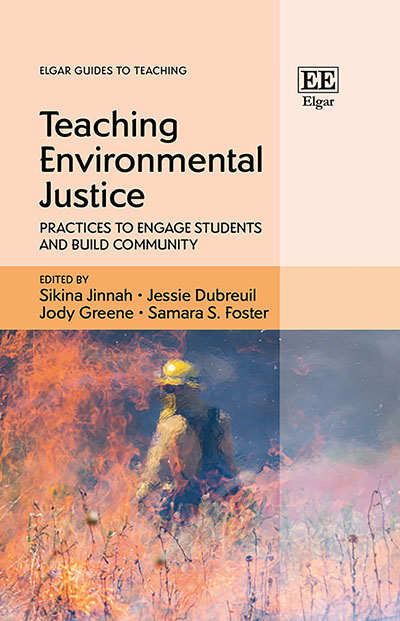 Professor Sikina Jinnah co-edited and contributed to the volume Teaching Environmental Justice: Practices to Engage Students and Build Community. This book originated in a desire to help instructors more effectively integrate concepts of environmental justice into the existing environmental politics curriculum using accessible, flexible, evidence-based pedagogical approaches that stimulate student engagement and enhance student learning. The multidisciplinary team of collaborators transformed this book into one that also offers instructors from any discipline – from ecology to history to economics and beyond – pedagogical strategies that can be used to center equity and justice not only in teaching practices but in the design of courses and curricula. This expansion in the scope of the book is particularly fitting for the subject matter, as centering equity and justice in the classroom – both as subject-matter and as pedagogical praxis – is an essential component of environmental justice. The goals of this book are threefold: (1) to provide instructors from diverse disciplines with concrete projects (i.e., assignments, class activities) for teaching environmental politics and justice; (2) to ground those projects in cross-disciplinary, evidence-based pedagogical approaches that center equity and justice in student learning; and (3) to develop a model for community-based faculty development that can communicate those pedagogical approaches across disciplines. This book presents the results of sustained and varied engagements between these scholar–teachers: a set of teaching products that can be integrated into many different types of courses, from those highly specialized in environmental politics and justice to those that seek to integrate a single module on an environmental issue, such as climate change or sustainability.
Professor Sikina Jinnah co-edited and contributed to the volume Teaching Environmental Justice: Practices to Engage Students and Build Community. This book originated in a desire to help instructors more effectively integrate concepts of environmental justice into the existing environmental politics curriculum using accessible, flexible, evidence-based pedagogical approaches that stimulate student engagement and enhance student learning. The multidisciplinary team of collaborators transformed this book into one that also offers instructors from any discipline – from ecology to history to economics and beyond – pedagogical strategies that can be used to center equity and justice not only in teaching practices but in the design of courses and curricula. This expansion in the scope of the book is particularly fitting for the subject matter, as centering equity and justice in the classroom – both as subject-matter and as pedagogical praxis – is an essential component of environmental justice. The goals of this book are threefold: (1) to provide instructors from diverse disciplines with concrete projects (i.e., assignments, class activities) for teaching environmental politics and justice; (2) to ground those projects in cross-disciplinary, evidence-based pedagogical approaches that center equity and justice in student learning; and (3) to develop a model for community-based faculty development that can communicate those pedagogical approaches across disciplines. This book presents the results of sustained and varied engagements between these scholar–teachers: a set of teaching products that can be integrated into many different types of courses, from those highly specialized in environmental politics and justice to those that seek to integrate a single module on an environmental issue, such as climate change or sustainability.
Sikina Jinnah also published the article The survival of the weakest: the echo of the Rio Summit principles in environmental treaties in Environmental Politics. This article examines the influence of the 1992 United Nations Conference on Environment and Development, known as the Rio Summit, on the design of subsequent international environmental agreements (IEAs). In particular, it investigates the extent to which the principles outlined in the Rio Declaration were integrated into IEAs concluded in the following years. The authors focus their investigation on three principles: the precautionary principle, common but differentiated responsibilities, and the polluter pays principle. Analyzing a collection of 2,211 IEAs and their 509 amendments, they find that the Rio Summit catalyzed the dissemination of these principles. However, the study also reveals that the Rio Conference was an inflection point, wherein weaker expressions of these principles became more prevalent. Stronger expressions, which were included in some IEAs prior to the Rio Summit, became relatively less common thereafter. They call this evolutionary process the ‘survival of the weakest.’
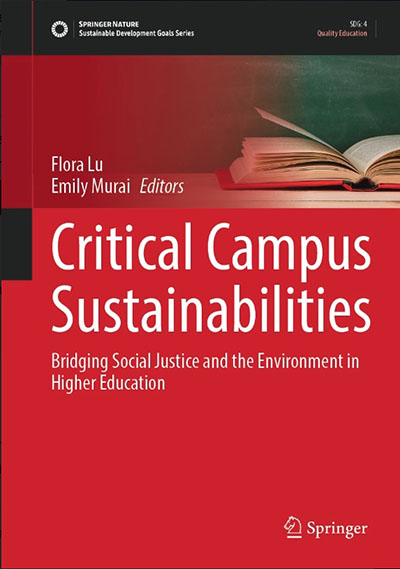 Professor Flora Lu and Lecturer Emily Murai published the book Critical Campus Sustainabilities: Bridging Social Justice and the Environment in Higher Education. Weaving together the broad literature on critical sustainability studies with voices from staff, alumni, graduate students, faculty and community members, this book highlights cross-disciplinary, multi-pronged approaches to promoting inclusive and just forms of sustainability and environmentalism in higher education. Centrally showcased is the People of Color Sustainability Collective (PoCSC) at UCSC, an innovative, unique and award-winning initiative founded in 2015 that aims to recognize, highlight, and institutionalize the sustainability practices of communities of color, and redefine sustainability to include diverse cultural approaches as well as a recognition of power dynamics, ethical considerations and intersectional identities. Over the years, PoCSC received many inquiries by faculty and staff at other universities to share its model, best practices, and research instruments. Drawing from three campus-wide surveys conducted in 2016, 2019 and 2022, several chapters in the book provide robust, empirical understanding of the gaps, (mis)conceptions and perspectives undergraduates hold about environmental concerns, zooming in on different facets of sustainability and providing insight into building more effective sustainability curricula and programming. Three chapters in particular examine student perspectives about the environment and environmentalism by race, gender, first generation status and declared major to document changing attitudes over the six year period, while another chapter examines student experiences of environmental health at the height of the COVID-19 pandemic. Other chapters draw from additional critical environmental approaches (e.g., anti-racist, community engaged, and critical feminist) to explore the history of environmentalism at UCSC; student demands for more inclusive environmental courses and curricula; and the deep educational value of co-curricular programming that connects UCSC students with environmental issues in the surrounding community.
Professor Flora Lu and Lecturer Emily Murai published the book Critical Campus Sustainabilities: Bridging Social Justice and the Environment in Higher Education. Weaving together the broad literature on critical sustainability studies with voices from staff, alumni, graduate students, faculty and community members, this book highlights cross-disciplinary, multi-pronged approaches to promoting inclusive and just forms of sustainability and environmentalism in higher education. Centrally showcased is the People of Color Sustainability Collective (PoCSC) at UCSC, an innovative, unique and award-winning initiative founded in 2015 that aims to recognize, highlight, and institutionalize the sustainability practices of communities of color, and redefine sustainability to include diverse cultural approaches as well as a recognition of power dynamics, ethical considerations and intersectional identities. Over the years, PoCSC received many inquiries by faculty and staff at other universities to share its model, best practices, and research instruments. Drawing from three campus-wide surveys conducted in 2016, 2019 and 2022, several chapters in the book provide robust, empirical understanding of the gaps, (mis)conceptions and perspectives undergraduates hold about environmental concerns, zooming in on different facets of sustainability and providing insight into building more effective sustainability curricula and programming. Three chapters in particular examine student perspectives about the environment and environmentalism by race, gender, first generation status and declared major to document changing attitudes over the six year period, while another chapter examines student experiences of environmental health at the height of the COVID-19 pandemic. Other chapters draw from additional critical environmental approaches (e.g., anti-racist, community engaged, and critical feminist) to explore the history of environmentalism at UCSC; student demands for more inclusive environmental courses and curricula; and the deep educational value of co-curricular programming that connects UCSC students with environmental issues in the surrounding community.
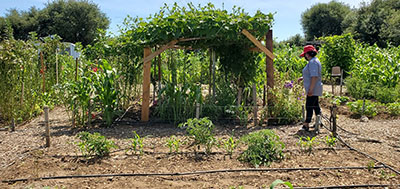 The book offers multiple examples that demonstrate the real world, life-changing implications of a more inclusive approach to sustainability and the environment in higher education. One co-curricular program in particular, the Apprenticeship for Community Engaged Research or (H)ACER, developed a rich university-community partnership between John R. Lewis College, one of the residential colleges at UCSC where (H)ACER is housed, and a community garden forming in nearby Watsonville, a largely agricultural community. Interning as a student researcher alongside several community members, contributing author (and now John R. Lewis College Academic Manager) Michelle Hernandez Romero found affirmation for her identity as an undocumented Latiné woman from rural Mexico. As she writes in the book, “The [Calabasas Community Garden in Watsonville] and my mentors nurtured my mental health and wellbeing during a time when I was close to giving up on higher education. My personal experiences as an immigrant woman from Mexico allowed me to build meaningful relationships and connections with different members of our community. I began learning about the significance of university-community relationships that work in synergy towards educational equity, student success and social and environmental justice.”
The book offers multiple examples that demonstrate the real world, life-changing implications of a more inclusive approach to sustainability and the environment in higher education. One co-curricular program in particular, the Apprenticeship for Community Engaged Research or (H)ACER, developed a rich university-community partnership between John R. Lewis College, one of the residential colleges at UCSC where (H)ACER is housed, and a community garden forming in nearby Watsonville, a largely agricultural community. Interning as a student researcher alongside several community members, contributing author (and now John R. Lewis College Academic Manager) Michelle Hernandez Romero found affirmation for her identity as an undocumented Latiné woman from rural Mexico. As she writes in the book, “The [Calabasas Community Garden in Watsonville] and my mentors nurtured my mental health and wellbeing during a time when I was close to giving up on higher education. My personal experiences as an immigrant woman from Mexico allowed me to build meaningful relationships and connections with different members of our community. I began learning about the significance of university-community relationships that work in synergy towards educational equity, student success and social and environmental justice.”
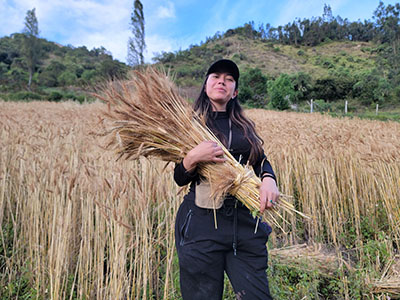 Assistant Professor Maywa Montenegro published an editorial, Celebrating 10 Years of Agroecology, in Agroecology and Sustainable Food Systems. Ten years ago, Agroecology and Sustainable Food Systems opened Volume 37, issue 1, with an editorial that announced the change of the name of the journal from the Journal of Sustainable Agriculture to Agroecology to the current name. For the past 10 years, this journal has been at the forefront of scholarly publishing in agroecology and has helped define what this movement is about, to advance scholarship at the cutting edge of transdisciplinary research, and to learn with and from peasants, Indigenous peoples, smallholders, and workers across the food system who are leading the way in transforming food systems worldwide toward justice and sustainability. At the time of the name change, the ecological foundations for agroecology had received much scientific attention, but the social and political components – where change is most needed – remained ill-defined and largely ignored by the Western scientific establishment. It became the journal’s goal to link research, practice, and social change. In this editorial, the authors celebrate the 10th Anniversary of ASFS and curated a collection of the most-read and most-cited papers from the past 10 years, as well several “editors picks” they feel exemplify the agroecological focus the journal promotes. The full collection is open access for the next 6 months.
Assistant Professor Maywa Montenegro published an editorial, Celebrating 10 Years of Agroecology, in Agroecology and Sustainable Food Systems. Ten years ago, Agroecology and Sustainable Food Systems opened Volume 37, issue 1, with an editorial that announced the change of the name of the journal from the Journal of Sustainable Agriculture to Agroecology to the current name. For the past 10 years, this journal has been at the forefront of scholarly publishing in agroecology and has helped define what this movement is about, to advance scholarship at the cutting edge of transdisciplinary research, and to learn with and from peasants, Indigenous peoples, smallholders, and workers across the food system who are leading the way in transforming food systems worldwide toward justice and sustainability. At the time of the name change, the ecological foundations for agroecology had received much scientific attention, but the social and political components – where change is most needed – remained ill-defined and largely ignored by the Western scientific establishment. It became the journal’s goal to link research, practice, and social change. In this editorial, the authors celebrate the 10th Anniversary of ASFS and curated a collection of the most-read and most-cited papers from the past 10 years, as well several “editors picks” they feel exemplify the agroecological focus the journal promotes. The full collection is open access for the next 6 months.
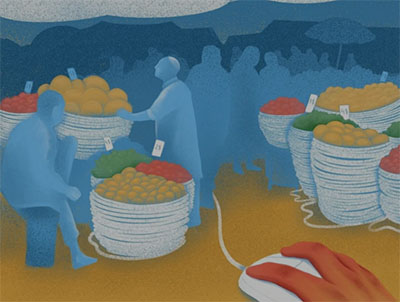 Assistant Professor Montenegro participated in The Data Policy Working Group of the UN FAO Civil Society and Indigenous Peoples Mechanism (CSIPM). CSIPM was formed in 2022 to represent peasant and Indigenous voices in drafting policy recommendations on data at the FAO Committee on World Food Security (CFS). As one of two scholars invited to participate in this group, Professor Montenegro conducted analysis of CFS draft policy documents; observed how “data” is understood by diverse communities in this space; and supported the Rome-based negotiations. The coauthored evaluation of the CFS Policy Recommendations on Strengthening Collection and Use of Food Security and Nutrition Data (October 2023) had a significant role in shaping the final policy recommendations that CFS now provides to all UN-member states. The team also coauthored a whitepaper—“The CSIPM Vision Statement on Data for Food Security and Nutrition” (September 2023)—that articulates a peasant- and Indigenous centered notion of data governance. A key intervention is their argument that while “data” in agriculture is frequently assumed to mean digitalization, automation, and machine-readable information, it can also emerge from and uplift qualitative, experiential, collective, and land-based knowledge systems.
Assistant Professor Montenegro participated in The Data Policy Working Group of the UN FAO Civil Society and Indigenous Peoples Mechanism (CSIPM). CSIPM was formed in 2022 to represent peasant and Indigenous voices in drafting policy recommendations on data at the FAO Committee on World Food Security (CFS). As one of two scholars invited to participate in this group, Professor Montenegro conducted analysis of CFS draft policy documents; observed how “data” is understood by diverse communities in this space; and supported the Rome-based negotiations. The coauthored evaluation of the CFS Policy Recommendations on Strengthening Collection and Use of Food Security and Nutrition Data (October 2023) had a significant role in shaping the final policy recommendations that CFS now provides to all UN-member states. The team also coauthored a whitepaper—“The CSIPM Vision Statement on Data for Food Security and Nutrition” (September 2023)—that articulates a peasant- and Indigenous centered notion of data governance. A key intervention is their argument that while “data” in agriculture is frequently assumed to mean digitalization, automation, and machine-readable information, it can also emerge from and uplift qualitative, experiential, collective, and land-based knowledge systems.
Professor Stacy Philpott published Land tenure security and luxury support plant species and trait biodiversity in urban community gardens in Frontiers in Sustainable Food Systems. Urban ecological communities are shaped by an array of environmental factors that include climate, biogeography, species interactions, dispersal, and habitat and landscape conditions. Moreover, social dynamics, development, policy, government actions, as well as socioeconomic status of residents – the so-called ‘luxury’ effect – may shape which species occur in urban habitats. These same ecological and social drivers may influence species richness as well as functional traits and functional diversity, with important implications for ecosystem services. Urban agroecosystems (or gardens) provide food and other benefits to urban residents, and are refuges for biodiversity in the city. Despite this, one of the biggest risks to gardens is insecure land tenure. Yet, little is known about how factors such as ‘luxury’ and land tenure security impact plant diversity, plant functional traits, and functional diversity, as well as species and trait composition. In the first study, “Land tenure security and luxury support plant species and trait biodiversity in urban community gardens”, Philpott and colleagues ask how garden physical features, luxury, and land tenure security influence plant species richness, functional diversity, and species and trait composition within gardens in the California central coast. They surveyed vegetation, assessed plant traits related to growth form, plant defense, and floral characteristics, and collected information on multiple factors associated with land tenure and luxury. They found that land tenure secure gardens had higher plant and crop richness. Variables associated with garden ‘luxury’ boosted ornamental plant richness, flower abundance and height, lowered crop richness, and strongly impacted plant species composition. Garden plot size negatively correlated with plant species and functional richness and relative abundance of trees. Weed species richness was not impacted by any social or physical feature examined. Thus overall, garden cultivated plants, and their traits, are strongly shaped by the socioeconomic factors of land tenure security and ‘luxury’ as well as the spatial distribution and size of garden plots, with important implications for both conservation and ecosystem services provided by garden habitats within cities.
Professor Philpott also published Promoting beneficial arthropods in urban agroecosystems: focus on flowers, maybe not native plants in Insects. In this article, Philpott and colleagues examined whether the presence of native plants in urban agroecosystems may help to support insect diversity. Native plants may be especially important in providing resources to pollinators and other beneficial arthropods, like natural enemies of pests, but little research has examined how native plants affect non-pollinators in gardens. They sampled plants, bees, and three groups of natural enemies (ladybeetles, ants, and ground-foraging spiders) in gardens in California. They found that native plants represented about 10% of the species and only 2.5% of the plants found. The native plants present did not have big impacts on abundance or diversity of bees, ladybeetles, or ants, but did have an unexpected negative effect on non-native spiders. Other garden features, such as garden size, flowers, mulch, and trees and shrubs, did have mostly positive impacts on the biodiversity of bees, ants, and spiders, but the impacts of each feature differed by organism type. Natural habitat near to gardens was also important for native ants, non-native bees, and ladybeetles. In sum, native plants, when rare within gardens, likely provide little benefit, but other garden features can be manipulated in order to promote beneficial arthropods in gardens.
Latin American and Latino Studies
Associate Professor Sylvanna Falcón published the report, Indigenous Land Defenders of Brazil: In Memoriam (2019-2022), a collaboration between the UC Digital Investigations Network (UCDIN) and the Cultural Survival organization. The University of California Digital Investigations Network (UC Network) partnered with Cultural Survival, a global indigenous-led non-governmental organization, to document the killing of 13 Indigenous land defenders alongside emerging regions of future concern for possible threats and targeting of Indigenous land defenders. Using open-source research methods, UC students connected defenders with their historic territories to understand the social-environmental crisis. This report is forthcoming in Portuguese. The UC Network consists of Human Rights Investigations Labs at the Dolores Huerta Research Center for the Americas at UC Santa Cruz, Promise Institute for Human Rights at UCLA, and the Human Rights Center at UC Berkeley. Additional coverage of the report was highlighted in LinkedIn.

 Professor and Chair Cat Ramírez, published an op-ed The 1943 Riot That Spotlights How Drag Show Bans Can Fuel Violence in The Washington Post. The op-ed marked the 80th anniversary of the Zoot Suit Riots by calling attention to the similarities between the furor over the zoot look during the Second World War and drag bans in the twenty-first century.
Professor and Chair Cat Ramírez, published an op-ed The 1943 Riot That Spotlights How Drag Show Bans Can Fuel Violence in The Washington Post. The op-ed marked the 80th anniversary of the Zoot Suit Riots by calling attention to the similarities between the furor over the zoot look during the Second World War and drag bans in the twenty-first century.
Professor Ramírez, along with artists Beatriz Cortez and Clarissa Tossin, discussed Latinxfuturism in an episode of AeroEspacial: El Dorado of Possibilities, produced by the Smithsonian National Air & Space Museum about Latino history, culture, and people and our connections to aviation and space.
In Catherine Ramírez, Redefining Assimilation, Professor Ramírez spoke about her book, Assimilation: An Alternative History (California, 2020), as a guest on the podcast Misma Project, an audio archive of conversations surrounding the US Latina experience.
Psychology
Assistant Professor Saskias Casanova published The value of communal and intergenerational settings for studying social and emotional learning in Child Development Perspectives. In this article, Casanova and post-doctoral researcher Melissa Mesinas, provide nuanced perspectives to studying social and emotional learning (SEL) outside the traditional school setting by expanding to Indigenous communal and familial contexts. The authors present research on how the Indigenous value of comunalidad, a collaborative way of thinking to achieve collective well-being among community members, and intergenerational practices such as story-telling to pass down Indigenous knowledge systems contribute to social and emotional learning competencies for youth. The authors consider how SEL can be more inclusive of Indigenous ways of knowing and living.
Assistant Professor Casanova also published Transfers tend to be an afterthought: the role of institutional support for staff in creating a receptive culture for transfer students of color in Journal of Diversity in Higher Education. This article, co-written with social psychology graduate student Valeria J. Alonso Blanco, examines staff perspectives about the support provided to transfer students of color at a four-year, Minority Serving Institution. The results highlight that staff depend on the Transfer Student Center to serve transfer students of color. Staff reflect on needing more institutional support to address the needs of transfer students of color and increase their knowledge about resources and barriers faced by these students. This research informs university practices and policies to successfully serve, retain, and graduate transfer students of color.
Professor Phil Hammack published Consensual nonmonogamous relationships during the COVID-19 pandemic in Sexualities. Scholars of intimate diversity recognize consensual nonmonogamy as a practice involving multiple partners simultaneously with knowledge and consent of all parties. In this interview study of individuals in consensual nonmonogamous relationships conducted during the lockdown period of COVID-19, challenges and opportunities were highlighted. Participants reported the way in which the lockdown both accelerated and decelerated some of their relationships. Of note was the way in which they reported the benefit of practicing nonmonogamy for health-related communication related to COVID-19, since they were already adept at open communication with partners about sexual health.
Professor Hammack also published Sexual and gender diversity in the 21st century in the journal Current Opinion in Psychology. The 21st century has been a time of change in cultural attitudes, social policies, and scientific understandings of sexuality and gender. This article introduces a special issue of Current Opinion in Psychology on sexual and gender diversity, highlighting such themes as (1) the need for new theories and approaches to meet the demands of a new century, (2) expansion beyond binary thinking about gender and sexuality and inclusion of diversity beyond the historic focus on homosexuality, (3) recognition of continued stigma and exclusion, (4) psychological challenges of heightened visibility for those diverse in gender and/or sexuality, (5) intersectional identities, and (6) opportunities and challenges of social technologies.
Distinguished Professor Campbell Leaper and former graduate student Christy Starr (and current Assistant Professor, University of Wisconsin-Madison) co-authored a research paper entitled That’s Not Me” (Dis)concordance between pSTEM nerd-genius stereotypes and self-concepts predicts high school students’ pSTEM identity in Social Psychology of Education. Nerd-genius stereotypes about people in the physical sciences, technology, engineering, and mathematics (pSTEM) are barriers to getting many adolescent girls interested in these subjects. Endorsing these stereotypes may undermine youths’ pSTEM identity especially when they are incongruent with their self-concepts—possibly more likely for girls than boys. Conversely, pSTEM identity may strengthen when stereotypes are congruent—possibly more for boys than girls. Based on a sample of high school students, the results generally confirmed the hypothesized model. That is, congruence between stereotypes and self-concepts predicted higher pSTEM identity. Conversely, incongruence predicted lower pSTEM identity.
Sociology
Associate Professor Hillary Angelo and Professor Miriam Greenberg co-authored the introduction to Environmentalizing Urban Sociology, a special edition of City and Community. This special issue calls for an environmentalization of urban sociology (rather than simply 'adding' the environment as an object of analysis). Urban sociology, like sociology as a whole, has traditionally excluded the natural environment. “De-natured” understandings of urban environments still pervade much urban sociological research. However, increasingly interconnected ecological and urban crises, including the collision of climate change with growing precarity and inequality along the lines of race and class, are bringing urban-environmental questions to the fore in new ways. The introduction explores the epistemological and political reasons why environmentalization has been a challenge and describes the long history of "incursions" from related fields. The growth of urban-environmental research in other disciplines, and the increasing influence of that work in urban sociology, alongside renewed attention to such issues as a result of climate change, leaves both authors cautiously optimistic about the future of this project.
Associate Professor Camilla Hawthorne published The Black Geographic: Praxis, Resistance, Futurity, a collection edited by Professor Hawthorne and Jovan Scott Lewis. Contributors to this volume explore the theoretical innovations of Black Geographies scholarship and how it approaches Blackness as historically and spatially situated. In studies that span from Oakland to the Alabama Black Belt to Senegal to Brazil, the contributors draw on ethnography, archival records, digital humanities, literary criticism, and art to show how understanding the spatial dimensions of Black life contributes to a broader understanding of race and space. They examine key sites of inquiry: Black spatial imaginaries, resistance to racial violence, the geographies of racial capitalism, and struggles over urban space. Throughout, the contributors demonstrate that Blackness is itself a situating and place-making force, even as it is shaped by spatial processes and diasporic routes. Whether discussing eighteenth- and nineteenth-century abolitionist print records or migration and surveillance in Niger, this volume demonstrates that Black Geographies is a mode of analyzing Blackness that fundamentally challenges the very foundations of the field of geography and its historical entwinement with colonialism, enslavement, and imperialism. In short, it marks a new step in the evolution of the field.
Assistant Professor Alicia Riley published Pandemic retelling: What GoFundMe posts reveal about the socioeconomic context of COVID-19 death and bereavement among Latinx & Spanish-speaking communities in the U.S. in Advances in Global Health. This article was co-led by two former UCSC undergraduate students and was initiated during their Building Belonging Fellowships working with Professor Riley. The study explored the social relationships, economic factors, and emotional experiences that surround COVID-19 deaths among the members of Spanish-speaking Latinx communities in the United States, as retold in user-written posts on the GoFundMe crowdfunding platform. The authors found that a more complete story about the socioeconomic context of COVID-19 deaths in Spanish-speaking and Latinx communities includes a focus on family roles, compounded financial hardship, risk of complicated grief, religiosity, and unexpected death.
